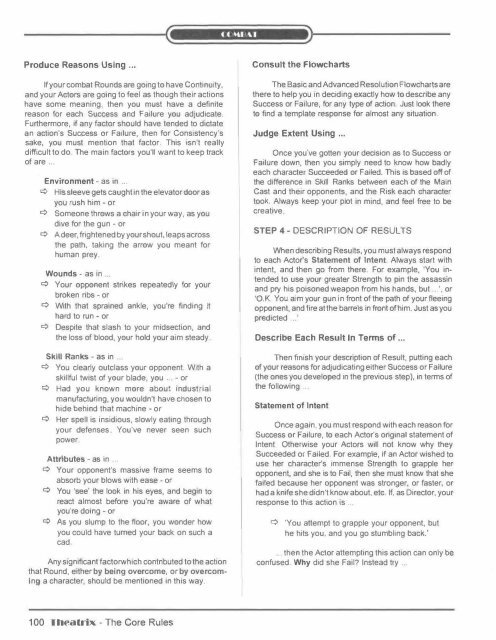Untitled - Index of - Free
Untitled - Index of - Free
Untitled - Index of - Free
You also want an ePaper? Increase the reach of your titles
YUMPU automatically turns print PDFs into web optimized ePapers that Google loves.
Produce Reasons Using ...<br />
If your combat Rounds are gorng to have Continu1ty.<br />
and your Actors are going to feel as though their actions<br />
have some meaning, then you must have a definite<br />
reason for each Success and Failure you adjudicate.<br />
Furthermore, if any factor should have tended to dictate<br />
an action's Success or Fa1lure, then for Consistency's<br />
sake, you must mention that factor This isn't really<br />
difficult to do The main factors you'll want to keep track<br />
<strong>of</strong> are ...<br />
Environment - as in ...<br />
q His sleeve gets caught in the elevator door as<br />
you rush him - or<br />
¢ Someone throws a chair in your way, as you<br />
dive for the gun - or<br />
¢ A deer, frightened by your shout.leaps across<br />
the path, taking the arrow you meant for<br />
human prey<br />
Wounds- as in ...<br />
q Your opponent strikes repeatedly for your<br />
broken ribs - or<br />
¢ With that sprained ankle, you're finding it<br />
hard to run - or<br />
¢ Despite that slash to your midsection, and<br />
the loss <strong>of</strong> blood, your hold your a 1m steady<br />
Skill Ranks - as in<br />
¢ You clearly outclass your opponent. With a<br />
skillful twist <strong>of</strong> your blade, you .. - or<br />
¢ Had you known more about industrial<br />
manufacturing, you wouldn't have chosen to<br />
hide behind that mach1ne - or<br />
¢ Her spell is insidious, slowly eating through<br />
your defenses You've never seen such<br />
power<br />
Attributes - as in ...<br />
¢ Your opponent's mass1ve frame seems to<br />
absorb your blows With ease - or<br />
¢ You 'see' the look in his eyes, and begin to<br />
react almost before you're aware <strong>of</strong> what<br />
you're doing - or<br />
q As you slump to the floor, you wonder how<br />
you could have tumed your back on such a<br />
cad<br />
Any s1gnificant factorwh1ch contnbuted to the action<br />
that Round, either by being overcome, or by overcom<br />
ing a character, should be mentioned in this way.<br />
100 Theatnx - The Core Rules<br />
Consult the Flowcharts<br />
The Basic and Advanced Resolution Flowcharts are<br />
there to help you 1n deciding exactly how to describe any<br />
Success or Failure, for any type <strong>of</strong> action. Just look there<br />
to find a template response for almost any situation<br />
Judge Extent Using ...<br />
Once you've gotten your decision as to Success or<br />
Failure down, then you simply need to know how badly<br />
each character Succeeded or Failed. This is based <strong>of</strong>f <strong>of</strong><br />
the difference in Skill Ranks between each <strong>of</strong> the Main<br />
Cast and their opponents, and the Risk each character<br />
took. Always keep your plot in mind, and feel free to be<br />
creative<br />
STEP 4 - DESCRIPTION OF RESULTS<br />
When describrng Results, you must always respond<br />
to each Actor's Statement <strong>of</strong> Intent Always start With<br />
intent, and then go from there. For example, 'You in<br />
tended to use your greater Strength to pin the assassin<br />
and pry his poisoned weapon from his hands, but ... ', or<br />
'O.K. You aim your gun In front <strong>of</strong> the path <strong>of</strong> your fleeing<br />
opponent, and fire at the barrels in front <strong>of</strong> him. Just as you<br />
predicted ... '<br />
Describe Each Result In Terms <strong>of</strong> ...<br />
Then fimsh your description <strong>of</strong> Result, putting each<br />
<strong>of</strong> your reasons for adjudicating either Success or Failure<br />
(the ones you developed in the previous step), in terms <strong>of</strong><br />
the following ..<br />
Statement <strong>of</strong> Intent<br />
Once again, you must respond with each reason for<br />
Success or Failure, to each Actor's original statement <strong>of</strong><br />
Intent. Otherwise your Actors will not know why they<br />
Succeeded or Failed For example, if an Actor wished to<br />
use her character's tmmense Strength to grapple her<br />
opponent, and she ts to Fail, then she must know that she<br />
failed because her opponent was stronger, or faster, or<br />
had a knife she didn't know about. etc. If, as Director. your<br />
response to this action is .<br />
Q 'You attempt to grapple your opponent, but<br />
he hits you, and you go stumbling back.'<br />
.. then the Actor attempting this action can only be<br />
confused. Why did she Fail? Instead try ...



